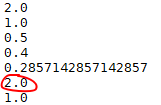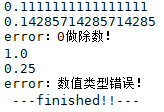Python的try/except异常捕获机制
当你执行大型程序的时候,突然出现exception,会让程序直接停止,这种对服务器自动程序很不友好,而python有着较好的异常捕获机制,不会立刻终止程序。
这个机制就是try-except。
1. 发生异常时可配置备用程序
aa = [1,2,4,5,7,0,2] for ii in aa: try: h = 2/ii print(h) except: #发生异常时备用 h = 2/(ii+1) print(h)

2. 单个异常捕获
dict_ = {} try: print(dict_['test']) print(' --- testing... --- ') except KeyError as e: print('--- the error is ---:', e) #单个异常 print(' ---finished!!--- ')

3. 多个异常捕获,循环中
num = [9,7,0,1,4,'16'] for x in num: try: print (1/x) except ZeroDivisionError: print('error:0做除数!') except TypeError: # 当报错信息为TypeError,执行下面的语句。 print('error:数值类型错误!') print(' ---finished!!--- ')

4. 通用异常:Exception,当你不知道异常的种类或者多少异常的时候,可以使用通用异常捕获,同时通用异常可以与特定异常混用。
num = [9,7,0,1,4,'16'] for x in num: try: print (1/x) except ZeroDivisionError: print('error:0做除数!') #特定异常和Exception混合使用 except Exception as e: print('the Exception is:',e) print(' ---finished!!--- ')

5. else语句:在被检测的代码块没有发生异常时执行
dict_ = {'test':'这个地方是哪里?'}
try:
print(dict_['test'])
print(' --- testing... --- ')
except KeyError as e:
print('--- the error is ---:', e) #单个异常
else:
print('没有发生异常!')
print(' ---finished!!--- ')

6. finally语句:不管有没有发生异常都会执行
dict_ = {'test':'这个地方是哪里?'}
try:
print(dict_['test'])
print(' --- testing... --- ')
except KeyError as e:
print('--- the error is ---:', e) #单个异常
else:
print('没有发生异常!')
finally:
print('总可以被执行的语句。。。')
print(' ---finished!!--- ')

##
参考:



 浙公网安备 33010602011771号
浙公网安备 33010602011771号